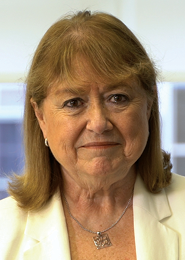- Home
- Media Kit
- Current Issue
- Past Issues
- Ad Specs-Submission
- Ad Print Settings
- Reprints (PDF)
- Photo Specifications (PDF)
- Contact Us

![]()
ONLINE


Susana Malcorra
Dean of the IE School of Global and Public Affairs
and Former Minister of Foreign Affairs and Worship for the
Republic of Argentina
We all have at our fingertips the work of many researchers, scholars and specialists who develop excellent theories and write wonderful books about leadership. My contribution, then, will focus on my experience and spring from what I have lived and live in my daily activities. I have occupied managerial or executive positions in many different organizations. I have been an executive with IBM in my native Argentina and with Telecom, where I was the CEO of the then third largest company in my country. From there I moved to the multilateral world and became COO of the World Food Programme in Rome, to later be appointed as Under-Secretary-General in New York in support of the United Nations Peacekeeping Operations worldwide. I then finished my career in the United Nations as Chief of Staff (called “Chef de Cabinet” in the UN), a position that I left to become Minister of Foreign Affairs and Worship of Argentina. Today, I am Dean of the School of Global and Public Affairs at IE University in Madrid. I am also one of the founders of GWL Voices for Change and Inclusion, an organization whose members are 54 women who have occupied important positions in the national and international arenas and whose purpose is to advance multilateralism and gender equality in the world.
In all those positions, with different responsibilities and resources, I have always performed as a manager to the best of my capacity. I have planned according to my goals, my resources, and the reality of the environment in which my organization developed its actions. Sometimes the environment was mainly determined by the marketplace, the available technology, the competitors and the regulators. Other times, the fundamental conditions were dictated by political realities, by humanitarian priorities or by the stipulations defined by donors. I have always carefully allocated the available resources to optimize execution. I have established feedback mechanisms and systematic controls to be ready to adjust plans and allocations as needed. Most importantly, I have paid close attention to my staff to understand where in the organization their contribution would be optimal, where they could best complement my own skills and what type of support, coaching and training they required to continue developing. Thus, in my role as a manager, the best possible scenario is that my plans would materialize without major disruptions. As a manager, I am an advocate for stability.
As a leader, in spite of achieving or exceeding our goals, I always feel uneasy about what we are doing. I suspect that we can do things at a completely different level, that we can engage with our “constituents” (customers, beneficiaries, policymakers, etc. depending on the organization) at an absolutely new level. It is a vision that says that we can take our organization to act at a superior level that was never tried before. As a leader, I am an advocate for change.
The vision becomes clearer the more I listen to the people I work with and it not only becomes clearer for me, it becomes clearer for all involved - it becomes our shared vision, one that we can all put our best efforts to achieve. As a leader, you are not the enlightened visionary. You have the passion to move things to a new, significantly higher level, and you have the humility and the patience to listen seriously, because it is from that listening and learning from multiple people that your strength comes. Real innovation comes from allowing people to freely express their views to create the material from which new ideas can be constructed.
That strange master of irony and leadership who was Niccolo Machiavelli wrote in The Prince: “It ought to be remembered that there is nothing more difficult to take in hand, more perilous to conduct, or more uncertain in its success, than to take the lead in the introduction of a new order of things.” Regardless of what degree of validity you assign to this statement, it certainly reminds us that leaders needs to enlist their people to become committed agents of change. The only way that this can be achieved is by spending time understanding people’s ideas and experiences and listening openly and with a disposition to change your own views. As a leader, you are passionately committed to take your group to a higher and better status for the good of the organization and of the individuals, but you are not committed from the start to the specific details of how this new status will look like.
Leaders have the passion, the capacity and the humility to work with their people to foster positive change in their organizations. However contradictory these two roles – as manager and as leader – may often appear, to be able to nimbly and deeply take on both is a fundamental trait of successful individuals and organizations.

Susana Malcorra
Dean of the IE School of Global and Public Affairs
and Former Minister of Foreign Affairs and Worship for the
Republic of Argentina